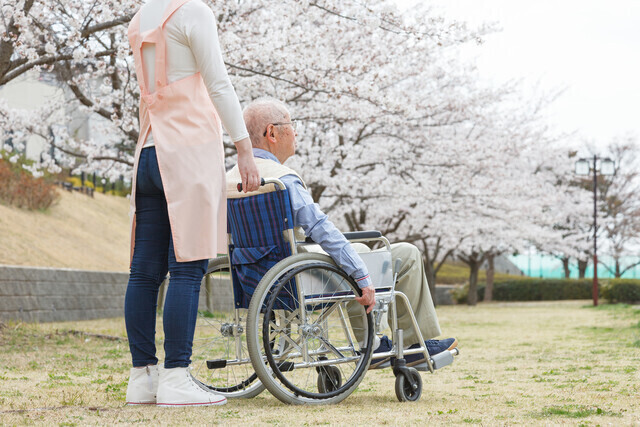hankyoreh
Links to other country sites 다른 나라 사이트 링크
Korea plans to grant permanent residency to select foreign care workers in areas facing population decline

South Korea is considering a plan that would grant permanent residency to migrant workers who have been employed as caregivers for five or more years in designated areas of the country with an aging population that face demographic decline.
The move is aimed at increasing the supply of younger care workers in aging areas with lacking care infrastructures by incentivizing them to work in areas where caregivers are in short supply.
An official from the Ministry of Health and Welfare discussed the plan in a telephone call with Hankyoreh on Sunday.
“With the entire world facing the problem of population aging, many countries are trying to attract young caregivers from abroad. South Korea will start by opening the door to university graduates with Korean language skills and knowledge of the social welfare system so that they can smoothly adapt to the caregiving field in this country,” the official said.
The official added that the Ministry of Health and Welfare recently proposed to the Ministry of Justice a plan to procure foreign caregivers and the two agencies are currently discussing related visa issues.
The Ministry of Health and Welfare’s proposal would grant foreigners who have graduated from health and welfare-related majors at South Korean universities and hold a job-seeking visa (D-10), after obtaining a senior care worker certification, long-term residency status depending on the length of time they work as caregivers in areas designated as facing population decline by the Ministry of the Interior and Safety.
As of 2023, 89 cities, counties and districts in Korea have been designated as facing population decline.
The Ministry of Health and Welfare estimates that more than 3,000 foreigners living in Korea are eligible to apply.
The plan is likely to grant migrant workers a long-term residency visa (F-2) valid for up to five years if they work in depopulated areas for three years or more, and a permanent resident visa (F-5) if they work for five years or more.
The permanent resident visa would allow workers to invite spouses and underage children to come and reside in South Korea, essentially allowing for family reunification.
The Ministry of Health and Welfare expects to implement the program as early as this year once the Ministry of Justice reviews and revises relevant guidelines.
The government’s decision to introduce the new system can be linked to the aging of the domestic caregiving workforce and the concentration of care workers in larger urban areas.
Last year, 62.3 percent of the more than 601,000 caregivers working in long-term care organizations nationwide were aged 60 or older. Moreover, most of the workforce is concentrated in metropolitan areas and large cities, leaving rural areas with older populations facing a serious shortage of caregivers.
By Cheon Ho-sung, staff reporter
Please direct questions or comments to [english@hani.co.kr]
Editorial・opinion
![[Column] Season 2 of special prosecutor probe may be coming to Korea soon [Column] Season 2 of special prosecutor probe may be coming to Korea soon](https://flexible.img.hani.co.kr/flexible/normal/500/300/imgdb/original/2024/0426/3317141030699447.jpg) [Column] Season 2 of special prosecutor probe may be coming to Korea soon
[Column] Season 2 of special prosecutor probe may be coming to Korea soon![[Column] Park Geun-hye déjà vu in Yoon Suk-yeol [Column] Park Geun-hye déjà vu in Yoon Suk-yeol](https://flexible.img.hani.co.kr/flexible/normal/500/300/imgdb/original/2024/0424/651713945113788.jpg) [Column] Park Geun-hye déjà vu in Yoon Suk-yeol
[Column] Park Geun-hye déjà vu in Yoon Suk-yeol- [Editorial] New weight of N. Korea’s nuclear threats makes dialogue all the more urgent
- [Guest essay] The real reason Korea’s new right wants to dub Rhee a founding father
- [Column] ‘Choson’: Is it time we start referring to N. Korea in its own terms?
- [Editorial] Japan’s rewriting of history with Korea has gone too far
- [Column] The president’s questionable capacity for dialogue
- [Column] Are chaebol firms just pizza pies for families to divvy up as they please?
- [Column] Has Korea, too, crossed the Rubicon on China?
- [Correspondent’s column] In Japan’s alliance with US, echoes of its past alliances with UK
Most viewed articles
- 1‘We must say no’: Seoul defense chief on Korean, USFK involvement in hypothetical Taiwan crisis
- 2[Editorial] Korea’s surprise Q1 growth requires objective assessment, not blind fanfare
- 3[Column] Season 2 of special prosecutor probe may be coming to Korea soon
- 4Is Japan about to snatch control of Line messenger from Korea’s Naver?
- 5Division commander ordered troops to enter raging flood waters before Marine died, survivor says
- 6No good, very bad game for Korea puts it out of Olympics for first time since 1988
- 7S. Korea “monitoring developments” after report of secret Chinese police station in Seoul
- 8The dream K-drama boyfriend stealing hearts and screens in Japan
- 9[Column] ‘Choson’: Is it time we start referring to N. Korea in its own terms?
- 10Is N. Korea threatening to test nukes in response to possible new US-led sanctions body?